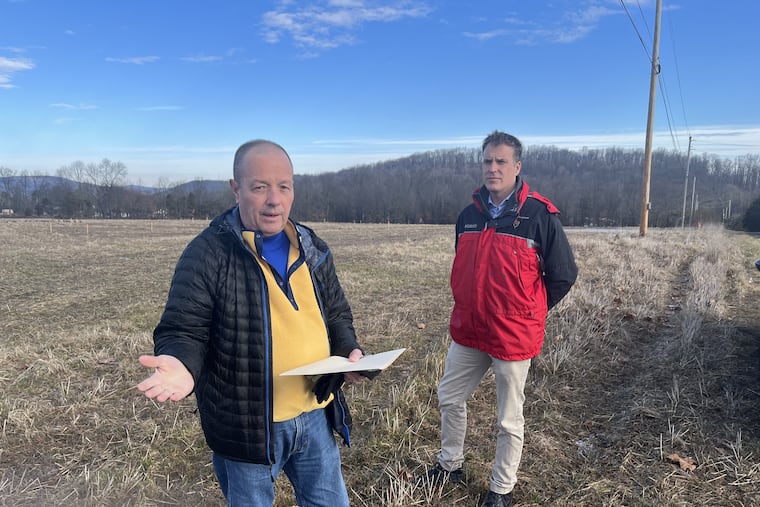Judge rules in favor of Montco residents opposed to using farm for municipal complex
The decision affirms that land obtained for open space under a state law must remain so.

A Montgomery County judge has sided with residents who oppose Upper Pottsgrove Township’s plan to use a farm set aside for open space as the location of a planned $5.5 million municipal complex.
The decision affirms that land obtained for open space under a Pennsylvania law must remain so.
Court of Common Pleas Judge Jeffrey S. Saltz also issued an injunction with his decision Friday and ordered Upper Pottsgrove’s Board of Commissioners to halt a bid for construction on the 36-acre, township-owned property known as the Smola Farm.
“We had a solid case and a great attorney who knew the law,” said Matthew Murray, a resident who sued to keep the land as open space. “I thank God our prayers were answered, and justice prevailed.”
What’s the Smola Farm?
Local officials purchased the property from Thomas Smola for $450,000 in 2008 to “utilize it for township open space.” Smola has since died.
In 2020, a subsequent group of commissioners started planning to use 3.2 acres of the farm for what they said was a much-needed new municipal complex to replace the current cramped offices that adjoin the fire department. Using the farm would save taxpayers money, they argued. About 1.2 acres of the land would be paved, and trails would be created on the remaining open space.
» READ MORE: Plan to build new municipal complex on open space sparks dissent, lawsuit in small Montco town
Some residents began objecting to the plan. Once quiet municipal meetings became tense with standing room only, with many in the crowd opposing using the farm for the complex.
Murray and another resident, Nathaniel Guest, sued, saying the plan violated the state’s Open Space Lands Act, because the farm was purchased with the intent to use it solely as open space.
Regardless, the township broke ground in January for a parking lot for the complex.
The decision
Saltz agreed with Murray and Guest. In his opinion, the judge wrote that while the act does not “explicitly” stop a municipality from using open space for another purpose, doing so would violate state lawmakers’ intent when they approved the measure.
“In view of the clear, albeit implicit, requirement of the Open Space Lands Act that a municipality acquiring property for open-space purposes must continue to abide by such purposes, and in view of the evidence showing that development of the proposed municipal complex would be contrary to the purpose for which the Smola Farm was acquired, the arguments put forth by the Township are not persuasive.”
Trace Slinkerd, president of the Upper Pottsgrove Township Board of Commissioners, could not be reached Monday for comment. The township has 10 days to decide whether to appeal.
However, Cathy Paretti, a commissioner who was against using the farm for the municipal complex, called the judge’s decision, “a victory not only for the residents of Upper Pottsgrove but for the preservation of open space across Pennsylvania.”
Catherine Harper, the attorney representing the residents, whom she credited for the fight, said the judge’s decision was clear about the intent of the Open Space Lands Act and has statewide implications.
“It reassures citizens and local government officials who are going to vote for an open space tax that the land will stay open,” Harper said on Monday.
The township’s side
Township officials laid out two basic arguments they believed allowed them to use the farm for the complex.
In the first, officials acknowledged that the Smola Farm had been purchased with a check written from the township’s open space fund. However, they said money other than from the township’s tax on open space had been commingled in the fund, including money from general funds and a bond. The township had also purchased other property from the open space fund around that same time.
So, officials argued, there was no way to tell whether money generated by the open space tax was used to buy the farm.
But Salz, the judge, found that it was the township’s problem that it had commingled funds. He said officials can’t expect residents to sort out which money was used to purchase the Smola property.
Township officials also argued that the municipal complex footprint would occupy only a small portion of the farm, leaving the rest as open space. They also noted that 2,100 square feet of land had already been developed for a cell tower.
Salz said, however, that the tower’s presence does not open other parts of the land to development.
The judge concluded: “When a local government uses or pledges open-space tax funds to acquire real property for open-space benefits under the Open Space Lands Act, it must continue to use the property only for open-space purposes.”